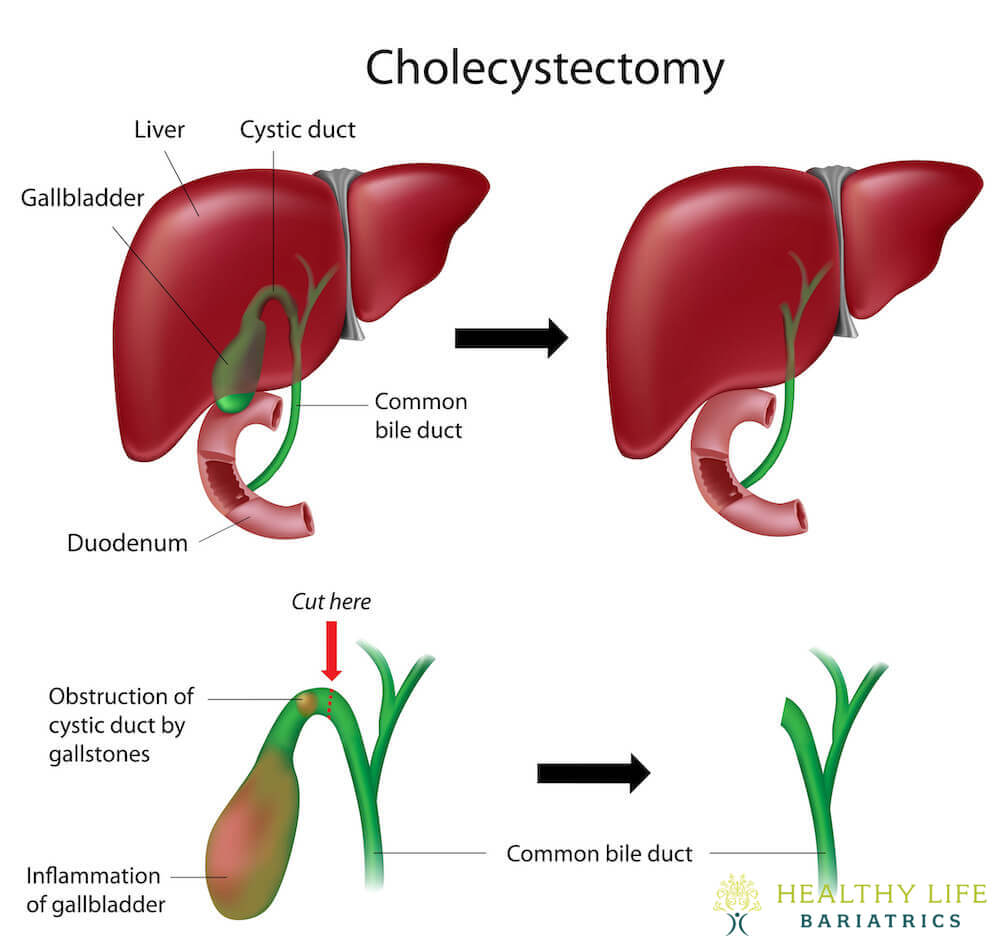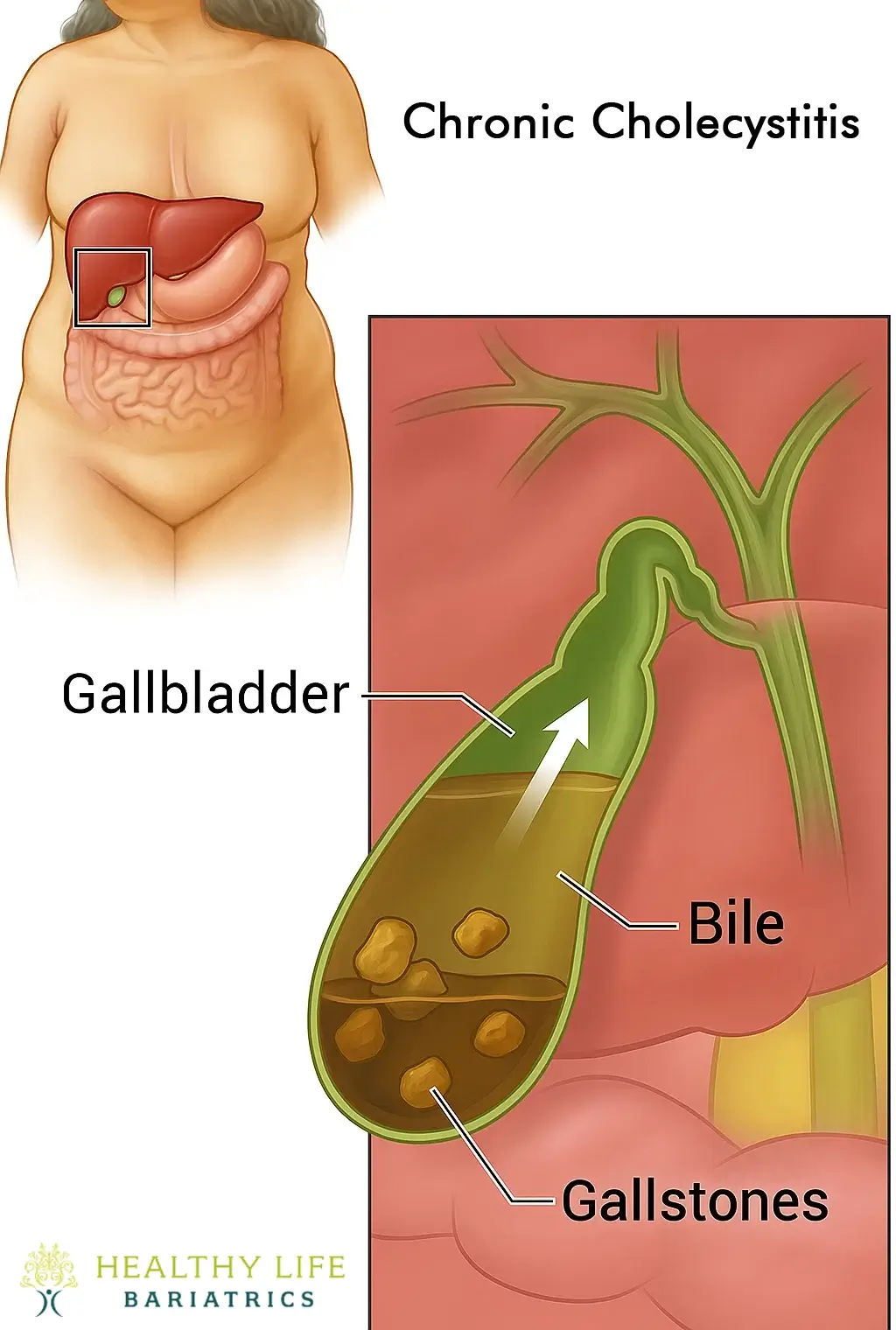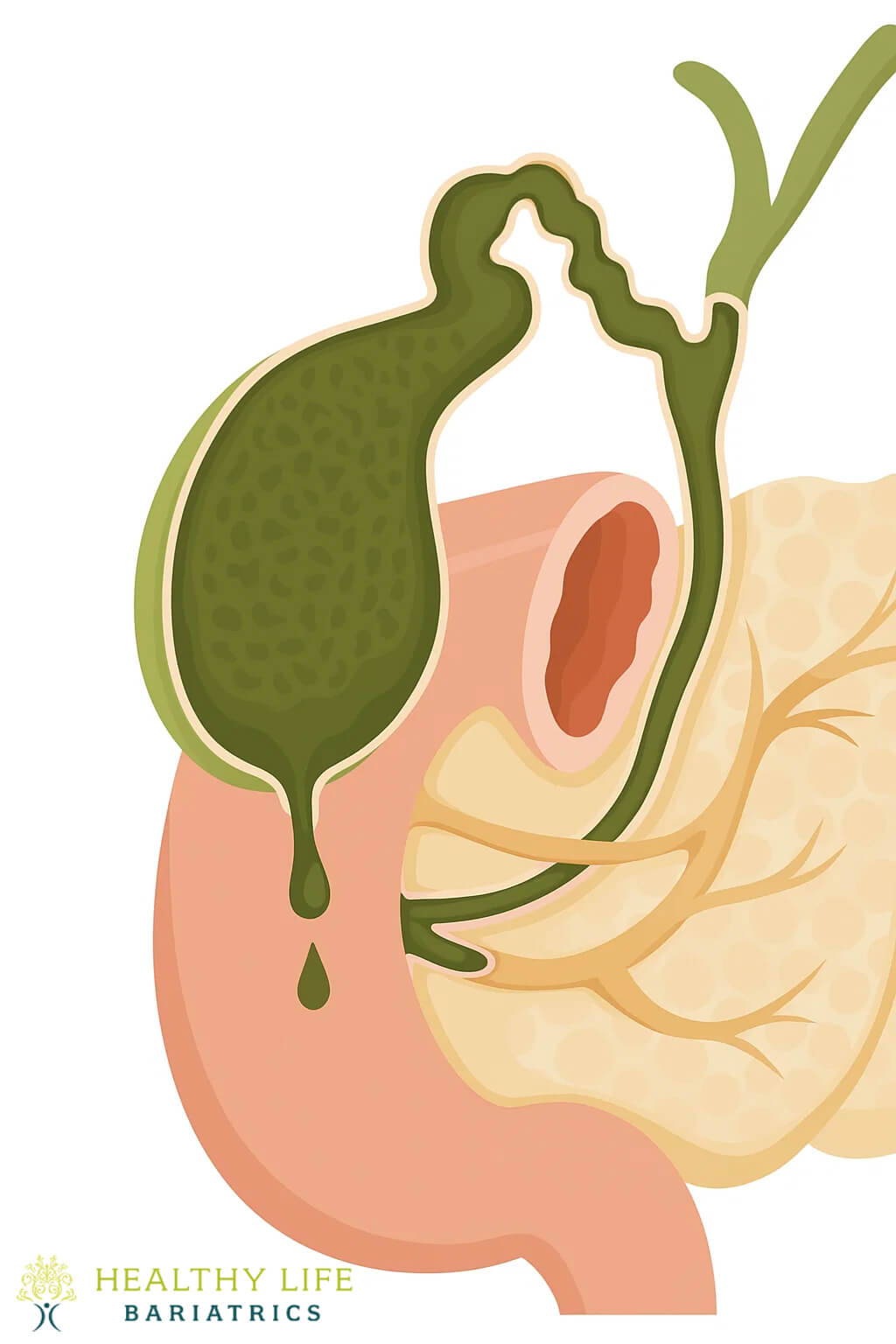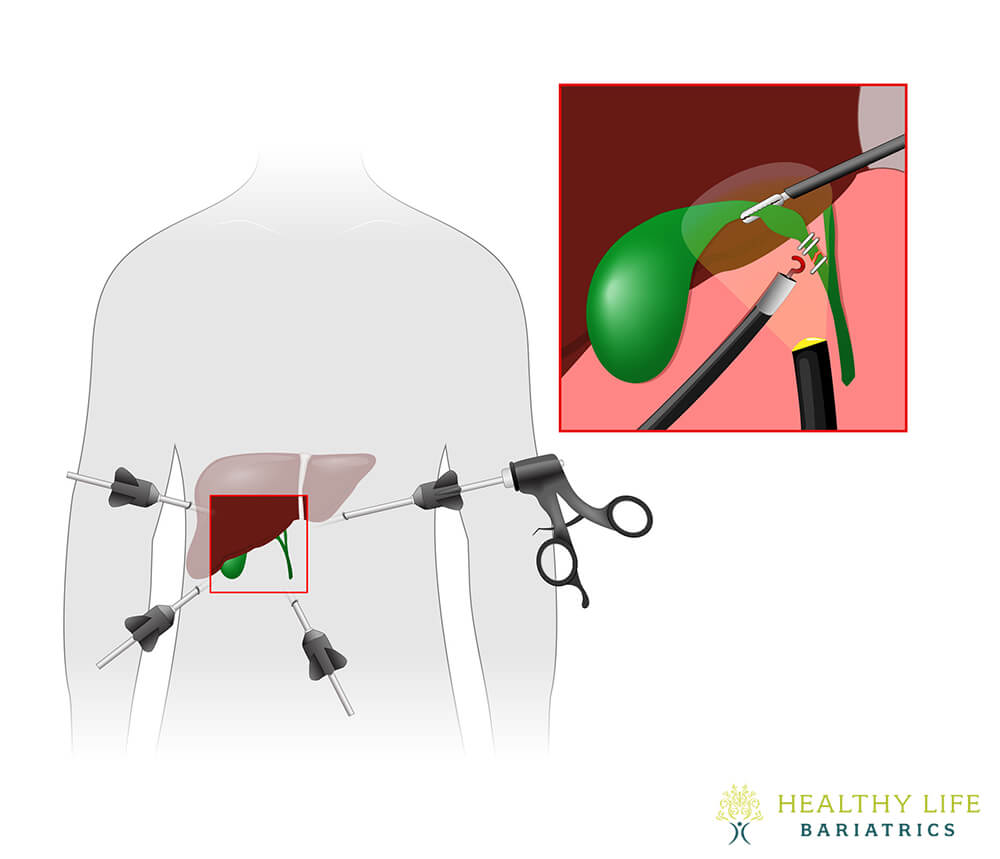What Is Chronic Cholecystitis?
Chronic cholecystitis and acalculous cholecystitis are two common inflammatory conditions affecting the gallbladder. Chronic cholecystitis is marked by persistent swelling and irritation that develops gradually over time, often due to repeated gallstone attacks.
In contrast, acalculous cholecystitis occurs without the presence of gallstones or obvious ductal obstruction, yet still results in significant gallbladder inflammation. Both conditions are serious and can lead to severe complications if left untreated.

Table of Contents
- What Is Chronic Cholecystitis?
- What Causes Chronic Cholecystitis?
- Symptoms of Cholecystitis
- Complications of Cholecystitis
- Cholecystectomy Surgery
- Post Cholecystectomy Syndrome Treatment
- Advancements in Treating Chronic Cholecystitis
- Postoperative Care and Recovery in Los Angeles
- What is Acalculous Gallbladder Disease?
- Acalculous Cholecystitis Treatment
- Acalculous Gallbladder Disease Symptoms
- What Causes Acalculous Gallbladder Disease?
- Ready to Discuss Surgery for Chronic Cholecystitis or Acalculous Cholecystitis?

What Causes Chronic Cholecystitis?
This condition tends to occur more often in women as opposed to men. Most patients are over forty with birth control pills and pregnancy being common culprits.
Symptoms of Cholecystitis
Chronic cholecystitis often develops silently, with no symptoms for years. Over time, it may flare into painful episodes, especially after consuming fatty meals. The most common symptom is sharp pain in the upper right abdomen, which may last over 30 minutes and radiate to the back or right shoulder blade.
Other warning signs include clay-colored stools, fever, nausea, vomiting, and jaundice a yellow tint in the skin or eyes indicating bile duct obstruction. Early gallbladder attacks (biliary colic) may come and go, but without treatment, the condition can worsen.
Complications of Cholecystitis
- Recurring gallbladder attacks
- Digestive problems due to poor fat absorption
- Pancreatitis from bile duct blockage
- Gallbladder rupture and bile leakage
- Increased cardiovascular risk
- In rare cases, gallbladder cancer
Without treatment, scarring and thickening of the gallbladder wall can make surgery more complicated. At Moein Surgical Arts, Dr. Moein offers diagnostic imaging and lab testing to confirm the presence of gallstones or inflammation. If necessary, surgical intervention can be performed to resolve the condition before further damage occurs.
If you're experiencing persistent abdominal pain or other signs of gallbladder dysfunction, schedule a private consultation with Dr. Moein to explore your treatment options and avoid long-term complications.
Cholecystectomy Surgery
Surgery is the most common treatment for long-term inflammation of the gallbladder. The surgery is low-risk and involves the removal of the gallbladder to prevent future diseases or conditions.
If you are too sick to have surgery, the gallstones can be dissolved with medicine taken orally. This method can take two years or longer to work, and the gallstones can return. Ideally, and if you can, you will take steps to restore your health to make surgery possible, which can offer permanent relief.
Advancements in Treating Chronic Cholecystitis
Cholecystostomy Tube Placement:
For individuals who are not suitable candidates for surgery, the placement of a cholecystostomy tube may be considered. This tube allows for the drainage of bile, alleviating symptoms and reducing inflammation.
Focused Shock Wave Therapy:
Recent advancements include focused shock wave therapy, a non-invasive method to address chronic cholecystitis. This innovative approach may offer an alternative, particularly for those seeking non-surgical options.
Postoperative Care and Recovery in Los Angeles
Pain Management and Medications:
For those undergoing surgical interventions, effective pain management is crucial for a smooth recovery. Los Angeles healthcare providers may prescribe medications and recommend strategies to alleviate discomfort during the healing process.
what is the recommended dietary treatment for a client with chronic cholecystitis?
Adjusting one's diet is a key component of recovery post-treatment. Individuals in Los Angeles recovering from chronic cholecystitis are often advised to follow a low-fat diet initially and gradually reintroduce normal foods to avoid digestive issues.
Follow-Up Appointments After Chronic Cholecystitis Treatment in Los Angeles:
At Healthy Life Bariatrics in Los Angeles, regular follow-up appointments with Dr. Babak Moeinolmolki are essential to ensure optimal recovery and long-term success after chronic cholecystitis treatment. These visits allow for close monitoring of recovery progress, early detection of potential complications, and personalised guidance to support a smooth return to daily activities. Timely follow-up ensures that any lingering symptoms or concerns are addressed promptly, improving long-term outcomes and patient satisfaction.
What is Acalculous Gallbladder Disease?
Otherwise referred to as acute acalculous cholecystitis, this condition causes inflammation of the gallbladder without evidence of gallstones. Severe illness can arise from other medical conditions, long-term illnesses, and trauma.
Unlike typical gallbladder disease caused by gallstones, acalculous cholecystitis results from reduced blood flow, bile stasis, or infection, all of which can lead to serious complications if not promptly diagnosed and treated. Early intervention is key to preventing gallbladder necrosis or perforation in high-risk patients.


Acalculous Cholecystitis Treatment
Surgery is often necessary when the condition has become chronic. Laparoscopic gallbladder surgery will remove the ill organ, absolving you of pain while eliminating the chances of the problem recurring.
Acalculous Gallbladder Disease Symptoms
Acalculous gallbladder disease can be difficult to distinguish from other gallbladder issues. Mild symptoms often include belching, gas, nausea, vomiting, food intolerance, and chronic diarrhea.
When the condition becomes severe, symptoms may appear suddenly, such as sharp pain in the upper right abdomen, fever, chills, jaundice, bloating, and nausea or vomiting after meals. In some cases, a healthcare provider may detect a distended gallbladder during a physical exam, and blood tests may show an elevated white blood cell count.
The chronic form of acalculous cholecystitis develops slowly, with less intense but recurring and vague abdominal discomfort.
What Causes Acalculous Gallbladder Disease?
Acalculous gallbladder disease can result from several physiological disruptions. These include severe inflammation, bile stasis (when bile doesn't flow properly), reduced oxygen supply to the gallbladder wall (ischemia), and bacterial overgrowth due to stagnant bile.
Common contributing factors include:
- Prolonged fasting or rapid weight loss
- Dependence on IV nutrition (TPN)
- Gallbladder stasis, where reduced stimulation leads to pressure build-up
- Impaired gallbladder emptying, often seen in biliary dyskinesia
These conditions interfere with normal bile flow, increasing the risk of inflammation and functional gallbladder problems even in the absence of gallstones.
Ready to Discuss Surgery for Chronic Cholecystitis or Acalculous Cholecystitis?
When your gallbladder is bothering you, you may not know where to turn. When you develop pain and other symptoms, a diagnosis can bring you relief through recommended surgery. Schedule a consultation with world-class general surgeon Dr. Babak Moeinolmolki by calling Healthy Life Bariatrics throughout Los Angeles, Encino, and Glendale, California – (310)807-2378.


